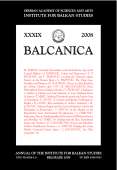On Dealing with the Past, Transitional Justice and Archives
On Dealing with the Past, Transitional Justice and Archives
Author(s): Despina SyrriSubject(s): History
Published by: Balkanološki institut - Srpska akademija nauka i umetnosti
Keywords: South-East Europe; transitional justice; archives; record-creating process; community of records; collective memories; colonizers/colonized
Summary/Abstract: This paper aims to explore initiatives in dealing with the past in South East Europe, particularly with regard to archives, and to reflect on discussions about the documentation of atrocities and sufferings and the shift from war to peace, ongoing in the Balkan countries affected by the 1 991 –999 wars while the countries are still struggling to find the best way(s) to deal with the past and its consequences. Transitional justice may be framed as opening up different approaches to create collective memories, to share and to transfer these through time-space. New technologies used in archiving are assumed to open new avenues to democratization and accountability, in communication and free circulation of information, and to create a much broader negotiating process, with significant opportunities for the preservation of memory(ies), documentation and contestation — a far more multi-sited, multi-scalar and multi-level board where novel alliances, formations and mediations might arise. One particular case is that of the digitization and public accessibility of the tribunals’ archives, which are supposed to constitute an important legal and cultural heritage that belongs to the world community, as well as to the states and the citizens involved. The information contained in these archives is expected to be made available for new forms of use, such as scientific research and investigation by/for surviving relatives, while respecting different legal constraints. The archives would also serve the advancement of the international justice system by explaining the workings of the tribunals to the general public. Consequently the important question that arises is the ownership of these archives. The reciprocal “production” and “consumption” (shaping) of the colonial narrative of history and identity entail that the former colonizers and colonized are a community of records, sharing a common archival heritage. Therefore, what in Western archival practice is called the subject of the record has to be reconsidered as a full partner in the record-creating process, as a co-creator of the record. These archives thus seem to constitute a “joint heritage” shared by a number of “communities of records”, contributing to the possible formation of new identities and politics.
Journal: BALCANICA
- Issue Year: 2008
- Issue No: 39
- Page Range: 221-242
- Page Count: 22
- Language: English

